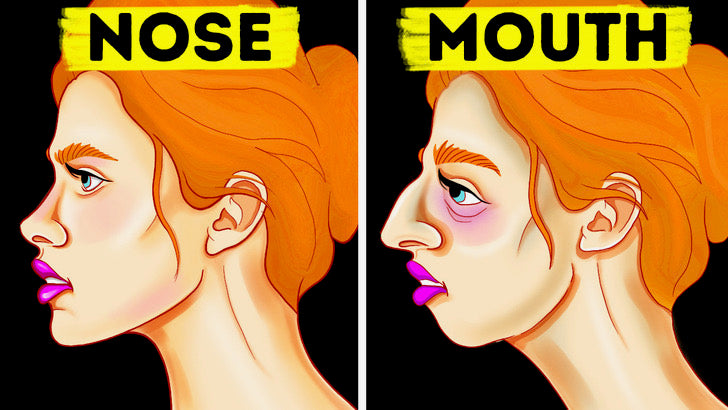FREE SHIPPING ON ORDERS $199+
FREE SHIPPING ON ORDERS $199+
Add description, images, menus and links to your mega menu
A column with no settings can be used as a spacer
Link to your collections, sales and even external links
Add up to five columns
Add description, images, menus and links to your mega menu
A column with no settings can be used as a spacer
Link to your collections, sales and even external links
Add up to five columns
How Mouth Breathing is Detrimental to Your Health
2 min read

You may know that mouth breathing can cause crooked teeth and bad breath. Yet the ramifications of mouth breathing are much more serious. Mouth breathing causes physical and psychological damage in children and adults. Some damage cannot be reversed.
Before we explore the signs of mouth breathing and what we can do to stop it, let’s look at the possible consequences.
- Facial abnormalities or deformities. In children, untreated mouth breathing results in an “adenoid face” or “long face syndrome.” While the severity of the facial abnormalities range child to child, a mouth breather’s face will typically have tired eyes, a crooked nose, a narrow face, a receding chin, a smaller airway, and bad neck and shoulder posture. Crooked teeth and bad breath accompany these facial structure abnormalities.
- Sleep disruption, sleep apnea . Anyone who breathes through their mouth at night has poorer quality of sleep and life. This results in many misdiagnoses.
- Dental problems and periodontal disease. A mouth breather carries their tongue in a low, downward position, so they can breathe more freely. This abnormal tongue activity puts excessive force on their teeth when they swallow, which may lead to crooked teeth, a poor bite, and periodontal disease. (The tongue should rest on the roof of the mouth with the lips sealed.)
- Posture problems and muscle fatigue. Mouth breathers tend to carry their heads forward to compensate for airway restriction. This poor posture leads to neck pain, temporomandibular joint (TMJ) tension, spinal disc compression, early arthritis, tension headaches, and dental occlusal (bite) problems. It also tightens the muscles in the chest, making breathing even more difficult.
- Reduced production of nitric oxide (NO) that contributes to many diseases and disfunctions. Enzymes in your nose and sinuses produce NO. It flows to your lungs and is absorbed into the blood. NO does many great things in the body. It dilates blood vessels, which decreases blood pressure and improves blood flow. It regulates inflammatory response and prevents blood clotting and obstructions in the arteries. It provides immune defense, enhances memory and learning, enables erectile function, protects the skin, regulates the bladder, improves gut function, promotes weight loss, relieves pain, protects the skin, and eases anxiety and depression.
- Increased anxiety and panic attacks. When we experience stress or anxiety, we tend to breathe fast and shallow. We may overcompensate by taking in more oxygen, breathing faster or through the mouth, possibly hyperventilating. This may increase anxiety and send more stress signals to your brain.
Subscribe
Sign up to get the latest on sales, new releases and more …
